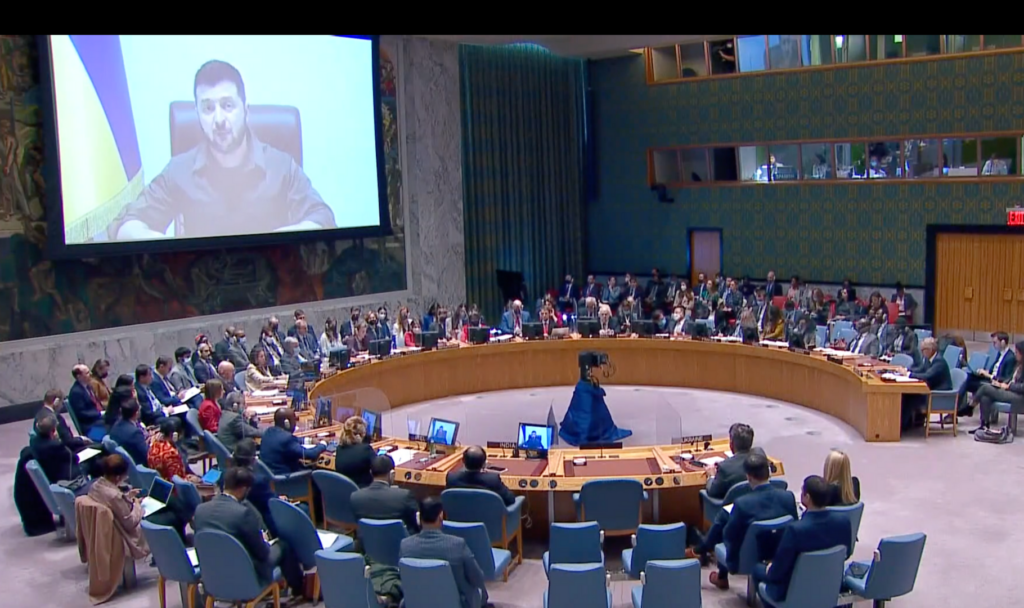New York, April 26 – For the first time in its history, the United Nations General Assembly has adopted a resolution to increase accountability whenever one of the world powers like the United States, Russia, France, United Kingdom and China cast a veto to block a call against military aggression or to provide humanitarian aid. Russia vetoed a UN Security Council resolution on February 25 that demanded an end to its invasion of Ukraine.
Those five countries are known as permanent members of the 15-nation Security Council with power to stop a resolution even if the measure is adopted by a majority of its members, including 10 other countries that are each elected for two-year term. The council tried but failed to stop Russia’s February 24 invasion and was denounced as ineffective in carrying out its world peace and security responsibility.
The 193-nation assembly adopted by consensus, meaning without a recorded vote, a resolution sponsored by 83 countries that allows it to convene within 10 days a formal meeting to debate after one or more of the permanent members have cast a veto. The resolution is titled “Strengthening of the United Nations System.”
Of the five permanent members, the US, United Kingdom and France supported the resolution while Russia and China did not. Other countries among the 83 countries that supported the resolution include the Albania, Australia, Austria, Belgium, Costa Rica, Denmark, Estonia, Fiji, Germany, Guatemala, Ireland, Liechtenstein, New Zealand, Norway, Myanmar, Romania, Singapore, Turkey and Ukraine.
“While not legally binding, it will allow the entire UN membership of 193 countries to have a say on vetoed resolutions, helping to increase accountability,” said United Kingdom Ambassador Barbara Woodward. “By doing so, the resolution seeks to give a voice to the entire UN membership on vetoed resolutions and make permanent members who have used their veto more accountable for their actions.”
“The founding members of the United Nations vowed to save generations that followed them from the scourge of war,” she said. “They conferred the primary responsibility for maintaining international peace and security on the Security Council. The UN Charter gives the permanent members the power of veto. This is a heavy responsibility, to be used in the interests of securing the peace and security that people around the world seek and the UN was established to provide.It is not to be used lightly. And should not, we believe, be used without accountability. It should not prevent the Council from fulfilling its mandate – which is why we have supported this resolution today.”
Woodward said Russia has used its veto 22 times in the last 10 years – to block aid to civilians and defend war crimes and in 2020, Russia and China vetoed a Security Council resolution to extend cross-border aid access from Turkey into Syria for a year, essentially cutting off humanitarian aid from millions of Syrian civilians.
UN member nations have tried for years but failed to reform the working procedures of the council, including reining in the veto power and expanding the number of permanent members for a more equitable representation of the membership.
Ukrainian President Volodymyr Zelensky made his first virtual address to the Security Council on April 4, urging the body to stop the war or failing that to disband itself.
“Russia was turning ‘the right of veto in the UN Security Council into a right to kill’,” Zelensky said, adding allegations of arbitrary killing of civilians, torture and rape and he called for investigation of war crimes.
“Are you ready to close the UN?” he asked. “Do you think that the time of international law is gone? If your answer is no, then you need to act immediately.”
United Nations correspondent journalists – United Nations correspondent journalists – United Nations correspondent journalists
United Nations journalism articles – United Nations journalism articles – United Nations journalism articles

